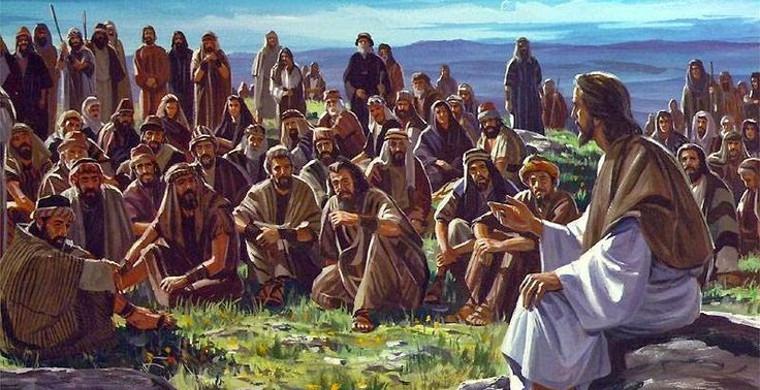
WHAT IF THE ACTUAL REASON WHY THE RABBIS REJECTED JESUS IS BEING HIDDEN FROM YOU?
What if Jesus is the best kept secret in Judaism,
hidden on purpose from all of us?
We all are witnesses of the exclusiveness that the Rabbis created for themselves in their tradition. But this is not something new. It was like that already 2000 years ago.
Jesus was the only one who dared to stand up against
the religious oppression
by breaking down the walls
that rabbinical tradition had put up.
Jesus opened the door to God for everyone:
for the simple ones and even for the Gentiles.
And so today,
thanks to Jesus, millions of Gentiles from all over the world,
from different cultures and countries,
believe in the God of Israel and
find a future, hope, comfort, joy and everlasting life
in the very same Jew who lived here, in Israel,
2000 years ago.
(We dedicated another video to the fact that the Rabbis depict Jesus as a sorcerer who led Israel into idolatry that you can watch here.)
NOW WE WOULD LIKE TO REVEAL THE ACTUAL REASON WHY JESUS WAS REJECTED BY THE RELIGIOUS LEADERS OF HIS TIME.
Contrary to the rabbinical explanation
and according to the descriptions in the New Testament gospels,
the actual reason why the Pharisees rejected Jesus as Messiah
lies in the fact that the religious leaders of his time were corrupt.
All they cared about was control, power
and to make money at the expense of the people.
Jesus threatened the exclusiveness of the sect which they had created.
They knew that if the people of Israel accepted and followed Jesus,
they’d lose their power, their influence, their control, their honored position and of course, their source of income.
But how can we know who was right?
It’s actually not that hard at all.
First, let’s go 2000 years back in time.
While the religious leaders at Jesus’ time, the Rabbis, were busy coming up with legalistic traditions and rules, isolating their people from the world and defying the Gentiles, Jesus on the other hand, talked about grace, modesty, compassion and love.
While the Rabbis were busy with oppressing and intimidating the people making them view God as some kind of moral monster who only wants to punish,
Jesus talked openly about the fact that
all need the love and forgiveness of God.
Forgiveness that is based on
God’s grace and compassion,
not on our own human attempts to impress him with all kinds of ceremonies and habits.
Where others
threw stones, Jesus forgave.
While others blamed the poor for their own suffering,
Jesus had fellowship with the outcasts,
willingly listened to their troubles,
healed the lepers and ate with the families of the rejected ones.
Where others only saw prostitutes, tax collectors and worthless fishermen,
Jesus saw a group of people with the potential to change the world.
Like every religion, the religion of the rabbinical tradition tries to develop the idea that God cares only about the members of their sect and hates the rest of the world. They wanted to make all of Israel believe that God cares only about Jews. In fact, the Rabbis have been claiming for 2000 years that only the Jews are important and that God doesn’t care about Gentiles, that they are not important and that their purpose lies in serving us, the Jews.
Jesus stood up against the claim that there is a group of people who are better or more important in God’s eyes than other people.
No matter if they’re Rabbis or Popes, Jesus and the NT calls them to love, grace and compassion, mercy and peace among people.
This threatened the intimidation and the oppression imposed by the rabbinical tradition.
AND WHAT ABOUT YOU?
Are you offended by Jesus’ sayings?
Like this one:
“Blessed are those who hunger and thirst for righteousness, for they shall be satisfied.
Blessed are the peacemakers, for they shall be called sons of God… Love your enemies and pray for those who persecute you…” (Matthew Chap. 5, NT)
Or how about this request of the NT:
“Be kind to one another, tenderhearted, forgiving one another…” (Epistle to the Ephesians, Chap. 4, NT)
Does that really sound bad?
Whoever takes courage and reads the NT will notice that
Jesus was gentle, modest, sensitive, compassionate,
loving and showed great kindness and compassion.
But what did make him angry was the use of
God’s name in vain
and the religious oppression on the part of the Rabbis of his time.
They were coming up with
rules, habits, ceremonies and strange traditions
that were forced upon the simple people,
claiming that this is God’s will.
They took power for themselves and controlled the people by spreading fear and threatening economically those who followed them.
And all this was done in God’s name.
Sound familiar?
POWER CORRUPTS
Many of the Rabbis of the Sanhedrin and the priests of Jesus’ time were hypocritical, corrupt, liars, and thieves.
Their deeds, done in God’s name, were in contradiction to the OT.
But Jesus was not the only one
who thought that way.
Reading, for example, what Josephus wrote, a Jewish historian at the time of the 2nd temple, we see that this was a dark time of
political corruption and wickedness.
The high priests’ appointments were purely political,
based on power and manipulation,
and the temple had become a marketplace.
When they noticed that Jesus had power to perform miracles in the name of the God of Israel and that they could not, they became jealous and feared to lose their position.
They did not want to lose their power and control over the people of Israel.
They did not want to lose their honorable position
and the respect they received from so many people.
And they knew that if the people of Israel were to
follow Jesus, the Messiah,
they would lose everything.
And for that reason the religious leaders
of rabbinical Judaism 2000 years ago, and until today,
reject Jesus and the fact that he’s the Messiah.
The Dead Sea Scrolls, dated to the Second Temple period,
also contain severe criticism against the
corrupt leaders of Judaism of that time.
This might be hard to believe, but even the Talmud,
Tractate Pesachim 57,
admits and attacks with determination the
corruption among the priestly families
in Israel at the time of Jesus.
In a lecture given by Professor Rachel Elior, Hebrew University, on the Dead Sea Scrolls, she says that the mere discovery of these scrolls in the Judean Desert, is proof of the poor condition the temple priesthood was in.
According to Elior, scrolls written by the Sadducean priesthood describe how they had to flee for their lives and hide from the new priests who replaced them by force.
In Prof. Elior’s opinion, when we find in the scrolls references to a war between “Sons of Light” and “Sons of Darkness,” the “Sons of Darkness” are the
corrupt priests who caused a spiritual decay and the destruction of the temple.
According to the book of Numbers, chapter 20, the priesthood was supposed to be passed on from father to son, and the High Priest ministered until the day of his death. However, according to the Encyclopaedia Hebraica, the spiritual leadership in Israel during the Second Temple period was so corrupt that the appointment of the High Priest was controlled by a group of rich and privileged priestly families from which most of the priests came.
According to Tractate Yoma 8 and 9, the high priests bought their position from the political rulers and took turns every year.
In other words, the Sages themselves admit that the
spiritual leadership at Jesus’ time was corrupt.
They used to harass the people without mercy.
The way the NT writings describe the level of corruption that the Rabbis and priests had reached during the Second Temple period is being backed up both from historical sources and the Talmud itself.
This is what Jesus fought against.
And because of that he was rejected by the religious leaders.
It’s important to understand that just like the prophets in the OT,
one of the tasks of the Messiah was to point out the sins of the religious leaders, rebuke them and show the people their real face.
So is it really that surprising that they rejected and killed him?
BUT GLADLY ENOUGH,
GOD
IS AN EXPERT IN TURNING BITTER INTO SWEET.
He used the rejection and the
death of the Messiah
to bring about
healing and forgiveness.
Just like the sacrifice on the altar offered in the temple for the sins of the people,
so is the Messiah the eternal sacrifice.
Not only for our sin but for the sins of the whole world.
The blood that was shed because of our sin has made for us a
new covenant.
Rabbi Isaac Liechtenstein, who lived in the 20th century, main rabbi of Hungary, was willing to swim against the tide. Though it was forbidden, he read the NT. These are his words:
“I used to think that the NT is an unclean book, a
source of pride selfishness, hate, antisemitism and violence.
But when I opened this book, I felt it capture my heart in a special and wonderful way. All of a sudden glory and light filled my soul.
I was looking for thorns, but I found roses,
pearls instead of stones,
I found love instead of hate.
Instead of revenge, I found forgiveness.
Liberty, instead of slavery.”
(Rabbi Isaac Liechtenstein)
Amazing, right?
When a Rabbi shows courage and instead of
blindly following the habit
of rejecting the Messiah hereads the NT with an open heart, his life changes completely. He does not try anymore to force rules and odd traditions on people as if we could impress God by doing so.
Rather, he understands that the peace the Messiah has come to give is first of all internal, for only in that way can our relationship with God be restored.
To sum it up:
Since the corrupt religious leaders of Jesus’ time did not want to lose their power and control, they didn’t have another choice but to reject God’s Messiah and to get rid of him.
However,
God used this to bring a
perfect sacrifice, forgiveness and atonement.
Thanks to the Messiah,
this good news would not be exclusive but spread throughout all the nations of the earth.
The Jewish Messiah became a blessing to the Gentiles.
This God who created, upholds and loves all of his creation
loves so much that he
revealed himself to humanity
and gave his life in the person of the Messiah,
for Jews and Gentiles.
https://www.oneforisrael.org/bible-based-teaching-from-israel/the-untold-reason-why-jewish-people-do-not-believe-jesus-is-the-messiah/

 RSS Feed
RSS Feed





















































